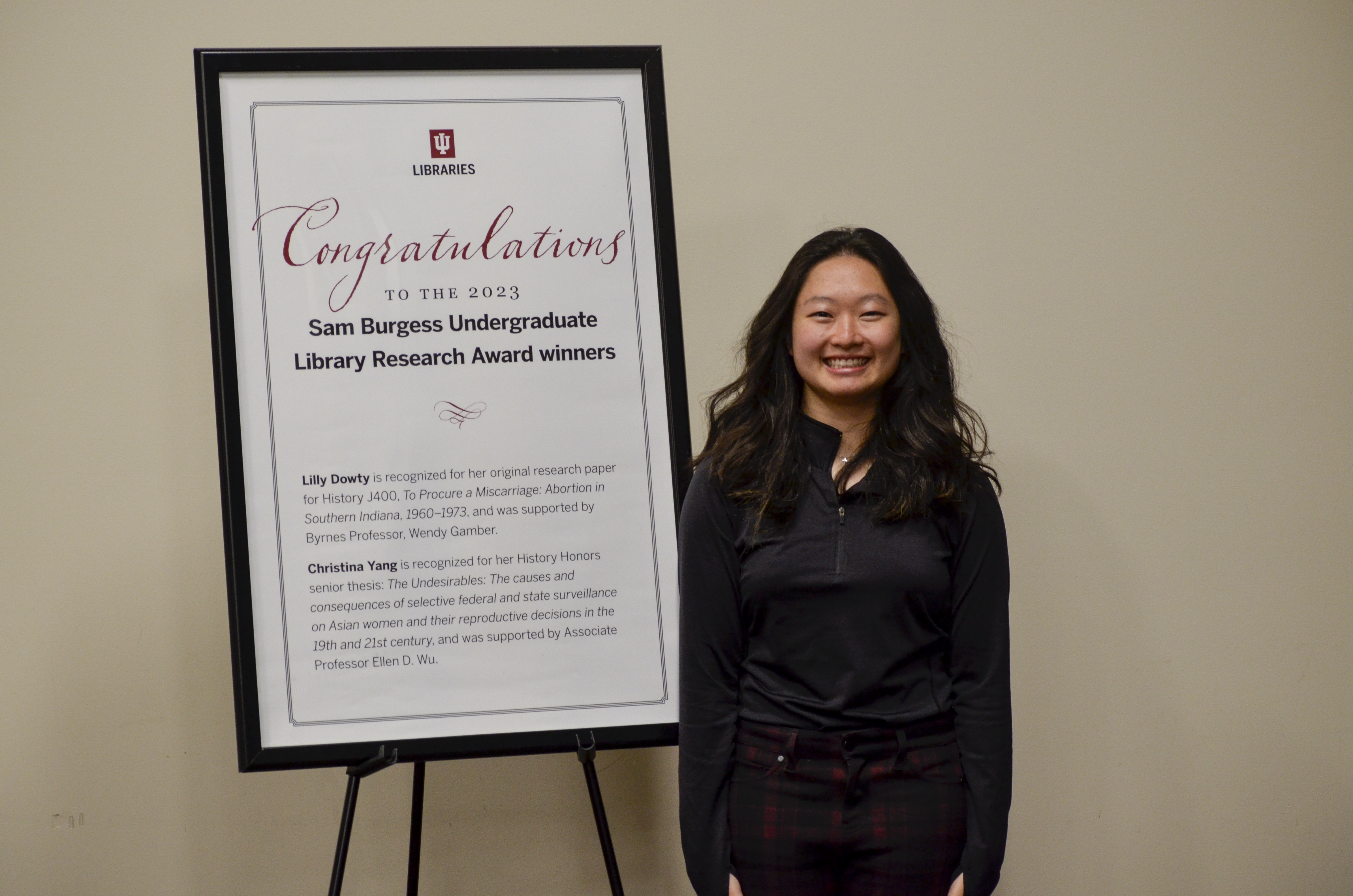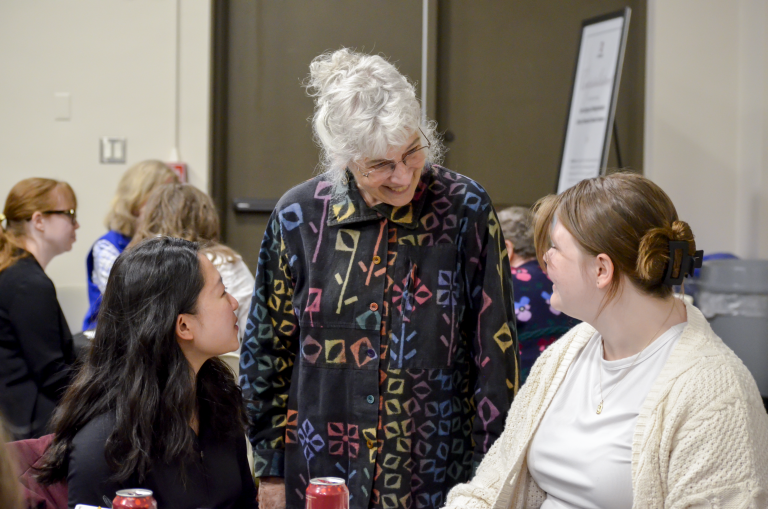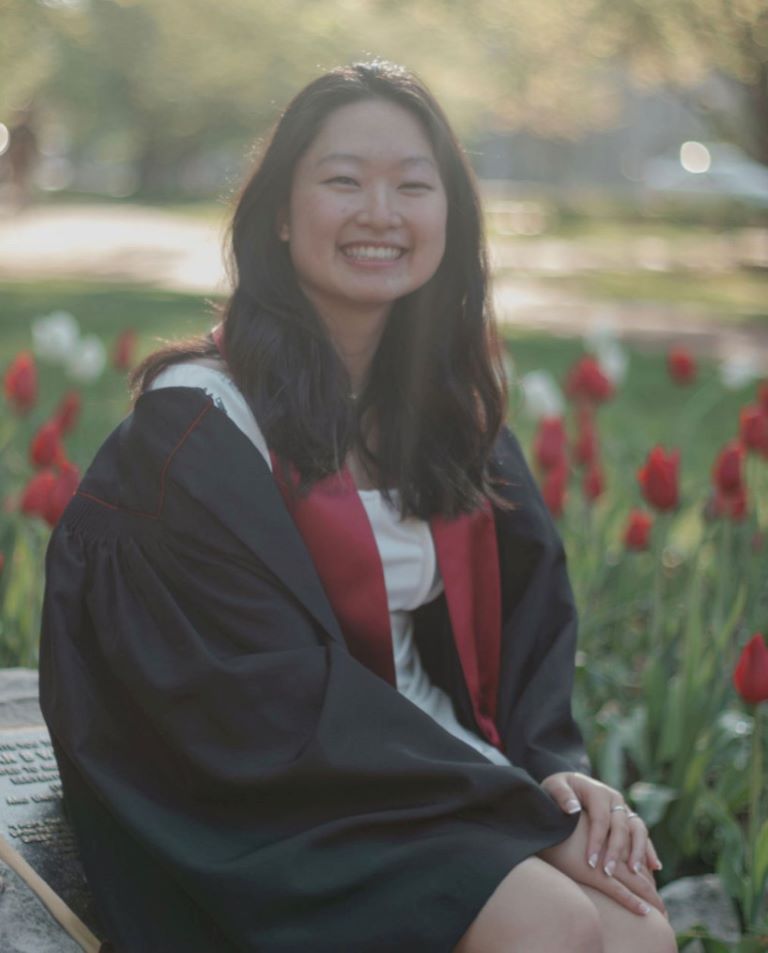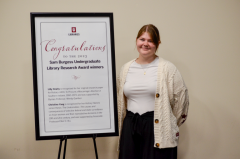
Christina Yang was recognized for her efforts at the Spring IU Libraries Spring Deans’ Advisory Board meeting. Photo courtesy of Ellie Pursley
Since 2006, IU Libraries has awarded the Sam Burgess Undergraduate Research Award to one or two undergraduate students yearly. This prestigious, monetary award seeks to acknowledge exceptional research by students in their formative college years. A paper explaining the use and process of library resources is required to apply. This essay gives IU Libraries an opportunity to see how the student used the research resources of the library, thus being able to identify a winner or winners.
Christina Yang was one of two recipients for 2023. “I found out about the Burgess Award through my research mentor, Dr. Ellen Wu, who has just been an incredible person to have in my corner,” Christina said. “She saw my potential before I even knew it, and I hope every student can find a mentor like her!”
Clearly impressed with Christina’s skills, Dr. Wu wrote enthusiastically about the undergraduate in the nomination letter: “Christina Yang is an extraordinarily sharp, creative, and motivated young scholar with deep research experience and tremendous potential. It has been a joy to witness Christina’s intellectual development through her rigorous inquiry process.” In her upcoming book, Dr. Wu will be citing some of Christina’s research.
Questions lead to research
Like Lilly Dowty, the other winner, Christina’s research was ignited by incidents in the news. She asked questions, sought out people who could help her answer those questions, and explored more questions. “I am a firm believer that any question we may have today, we can find answers through historical investigations,” she stated. In Christina’s case, she started asking questions about the targeting of Asian women. “When I saw the news about the 2021 Atlanta spa shootings that killed Asian Americans and Pacific Islanders (AAPI) female service workers, I could not help but wonder why—Why Asian women?” she asserted. It became the essential question she built her research upon.
Having a discussion with Dr. Wu about the 1874 Page Act led to identifying the 2015 Indiana court case State of Indiana v. Purvi Patel. Christina explains, “We thought these two cases would make a fascinating and unique comparative case study. Together, they ended up painting a more complete picture of the AAPI women's experience for me: How governments and citizens rely on a web of racial, gender/sexuality, and class stereotypes to uphold the heightened suspicion and violence against the AAPI woman's body.”
Jo Burgess, former IU librarian and benefactor of the Burgess Award, speaks with Christina and Lilly at the Spring IU Libraries Spring Deans’ Advisory Board meeting where the two scholars were recognized.
Photo courtesy of Ellie Pursley
The many tools of research
Christina’s research was extensive. As a good researcher, she established a baseline first by seeing what research was already done. She turned to books and journals by using IUCAT. She said, “From checking out classics from IU Libraries to reading recent journal articles offered on IU Libraries’ subscription to JSTOR in the fields of Asian studies, history, law, gender studies, and sociology, I reviewed hundreds of works—and relied on 40 for my final paper—all of which not only built the foundation of my research but also provided me with unique insights on finding what was missing.” Something was missing. Christina noticed a lack of intersectionality when looking at the Page Act and the Patel case.
For her next phase of research, Christina stated, “I conducted a content analysis on primary sources obtained from the federal and state government. For the former, I relied on IU Libraries’ access to the Congressional Records collection.” She attended IU Libraries workshops to learn how to utilize the Congressional Record. This research yielded transcripts, which Christina noted as one of her favorite tools of research. “Whether it be the Congressional Record in the 19th century or Patel's 2015 trial court and 2016 appellate court proceedings, immersing myself in those documents made me feel like I was in the room when everything went down. I found myself losing track of time, just getting into the mindset of the stakeholders through their words and actions, slowly connecting the dots, and finally furiously jotting down those ‘Eureka moments’ that became the backbone of my thesis.”
Dr. Wu also remarked on Christina’s ingenuity and determination in retrieving research. “Most impressively—after consulting with Maurer Law School librarians—Christina took the initiative to contact the Indiana Court of Appeals. She requested, received, and reviewed the trial transcripts for the Patel case—1000 pages in total.”
The results of research
As Christina wrote in her research, “I argue that when racial stereotypes intersect with overlapping gender and class identities, certain Asian women become vulnerable to selective targeting by authorities.” First, she described the background of the 1874 Page Act that prohibits the immigration of all Asian women. Second, she described the more recent court case where Purvi Patel was charged with feticide after a miscarriage. Though these two incidents are over a century apart, Christina concluded that they are similar. “Thus, in principle, this ‘problem’ in 2013 is no different than the ‘problem’ in the 1870s,” she deduced. “The government fears certain Asian practices—or at least what they purport Asian practices to be—and they use the tool of selective policing in response to this fear.”
Encouraging other undergraduates to do research, Christina states, “Speaking from the other side of the mountain, I would really encourage you to be bold and show people your work.” She suggested, “It doesn't have to be even close to done; in fact, the drafting stage is the perfect time for everyone (professors, mentors, friends, etc.) to look over what you have and for you to start articulating your thoughts out loud instead of just having them marinate in your brain or seeing them on a piece of paper.” Christina shared her work with not one, but three history professors. “We ended up having a rich discussion about my framework, methods, findings, and implications that I wished I had shared my work even earlier!”
Besides professors, you can look to the librarians and staff of the Indiana University Libraries. They are personal stewards for your research. They partner with faculty to help create meaningful research opportunities that will expand your knowledge and skill. Researching a topic you are passionate about excites your creativity and becomes a project you won’t forget.



